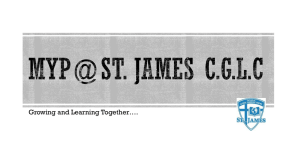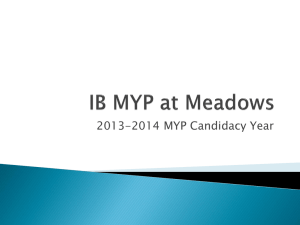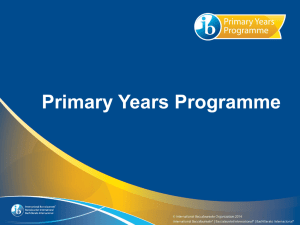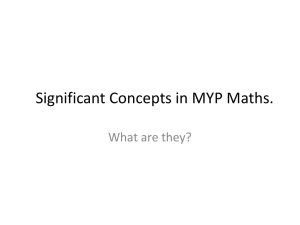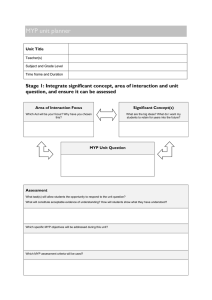Key findings from research on the impact of IB programmes in the
advertisement
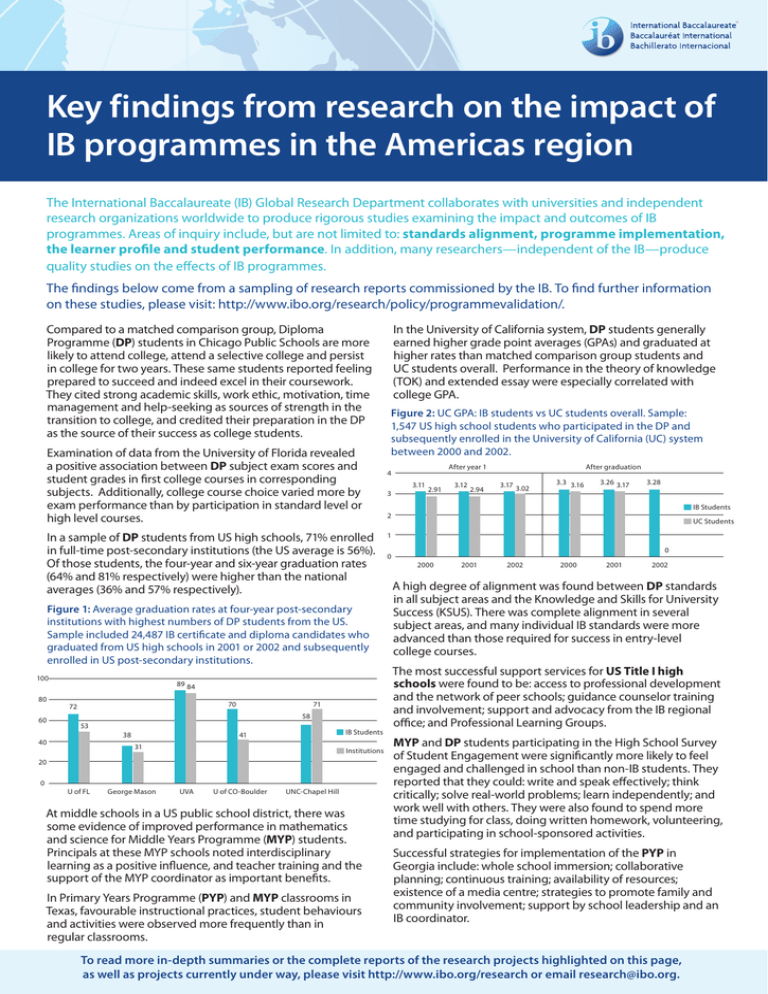
Key findings from research on the impact of IB programmes in the Americas region The International Baccalaureate (IB) Global Research Department collaborates with universities and independent research organizations worldwide to produce rigorous studies examining the impact and outcomes of IB programmes. Areas of inquiry include, but are not limited to: standards alignment, programme implementation, the learner profile and student performance. In addition, many researchers—independent of the IB—produce quality studies on the effects of IB programmes. The findings below come from a sampling of research reports commissioned by the IB. To find further information on these studies, please visit: http://www.ibo.org/research/policy/programmevalidation/. Compared to a matched comparison group, Diploma Programme (DP) students in Chicago Public Schools are more likely to attend college, attend a selective college and persist in college for two years. These same students reported feeling prepared to succeed and indeed excel in their coursework. They cited strong academic skills, work ethic, motivation, time management and help-seeking as sources of strength in the transition to college, and credited their preparation in the DP as the source of their success as college students. Examination of data from the University of Florida revealed a positive association between DP subject exam scores and student grades in first college courses in corresponding subjects. Additionally, college course choice varied more by exam performance than by participation in standard level or high level courses. In a sample of DP students from US high schools, 71% enrolled in full-time post-secondary institutions (the US average is 56%). Of those students, the four-year and six-year graduation rates (64% and 81% respectively) were higher than the national averages (36% and 57% respectively). Figure 1: Average graduation rates at four-year post-secondary institutions with highest numbers of DP students from the US. Sample included 24,487 IB certificate and diploma candidates who graduated from US high schools in 2001 or 2002 and subsequently enrolled in US post-secondary institutions. 100 80 60 89 84 70 72 71 58 53 38 40 IB Students 41 31 Institutions 20 0 U of FL George Mason UVA U of CO-Boulder UNC-Chapel Hill At middle schools in a US public school district, there was some evidence of improved performance in mathematics and science for Middle Years Programme (MYP) students. Principals at these MYP schools noted interdisciplinary learning as a positive influence, and teacher training and the support of the MYP coordinator as important benefits. In Primary Years Programme (PYP) and MYP classrooms in Texas, favourable instructional practices, student behaviours and activities were observed more frequently than in regular classrooms. In the University of California system, DP students generally earned higher grade point averages (GPAs) and graduated at higher rates than matched comparison group students and UC students overall. Performance in the theory of knowledge (TOK) and extended essay were especially correlated with college GPA. Figure 2: UC GPA: IB students vs UC students overall. Sample: 1,547 US high school students who participated in the DP and subsequently enrolled in the University of California (UC) system between 2000 and 2002. After year 1 4 3.11 3 2.91 3.12 2.94 After graduation 3.17 3.02 3.3 3.16 3.26 3.17 3.28 IB Students 2 UC Students 1 0 0 2000 2001 2002 2000 2001 2002 A high degree of alignment was found between DP standards in all subject areas and the Knowledge and Skills for University Success (KSUS). There was complete alignment in several subject areas, and many individual IB standards were more advanced than those required for success in entry-level college courses. The most successful support services for US Title I high schools were found to be: access to professional development and the network of peer schools; guidance counselor training and involvement; support and advocacy from the IB regional office; and Professional Learning Groups. MYP and DP students participating in the High School Survey of Student Engagement were significantly more likely to feel engaged and challenged in school than non-IB students. They reported that they could: write and speak effectively; think critically; solve real-world problems; learn independently; and work well with others. They were also found to spend more time studying for class, doing written homework, volunteering, and participating in school-sponsored activities. Successful strategies for implementation of the PYP in Georgia include: whole school immersion; collaborative planning; continuous training; availability of resources; existence of a media centre; strategies to promote family and community involvement; support by school leadership and an IB coordinator. To read more in-depth summaries or the complete reports of the research projects highlighted on this page, as well as projects currently under way, please visit http://www.ibo.org/research or email research@ibo.org. The below findings are from a sampling of independent research reports, journal articles and dissertations written by individuals or groups not in collaboration with the IB. In a survey of all new students at the University of British Columbia at the start of their first semester, DP students were at least 20% more likely to rate the following skills as “very good” or “excellent”: research, ability to read and comprehend academic material, ability to make and prepare a presentation and ability to write clearly and effectively. At the end of their first semester, DP students were also considerably more likely to have participated in student leadership activities, volunteer work, tutoring/teaching other students and student clubs/ organizations (Bluhm 2011). A study focused on the reflections of DP graduates from two Canadian high schools regarding the programme’s curriculum, preparation for post-secondary studies and level of stress experienced while in the programme, found that “most respondents appreciated being exposed to what they considered…a richer curriculum with a wider range of topics they could discuss in some depth. They also felt that, as a result of being in IB, they developed good critical thinking skills. Overall, they rated the IB curriculum very highly” (Taylor and Porath 2006: 154). A study exploring the international understanding of DP and advance placement (AP) students at two US high schools, suggests that while there was no significant difference between the groups on a survey of worldview, the IB students’ self-definition of the concept included more elements of international understanding, and utilized “a richness of vocabulary and language to express and personalize their values in their definitions”. Because the groups did not differ on standardized state assessments and the DP students’ “expressed belief that particular courses in school had enhanced their international understanding”, the author attributes differences to the effect of the programme (Hinrichs 2003: 344). In a series of studies on attitudes relating to the DP in the US, IB students interviewed at one school viewed the programme as promoting a “learning environment that broadened their horizons, increased their breadth and depth of knowledge and improved their writing skills and … study habits” (234). A survey of 28 DP graduates reinforced that these beliefs stay with them through university life, and “provide the longterm perspective that the IB DP is successful in achieving… admission to a selective post-secondary institution with advanced standing” (237). Fourteen faculty interviewed “perceived IB as focusing more on global issues, requiring higher level thinking skills, applying learning, developing links between concepts and covering a broader spectrum of topics” (235). Finally, 20 interviews with admissions directors at top universities and colleges indicated participation in the DP was “beneficial to…admission and awarding of advanced credit… [and]…report that the IB DP is perceived as a rigorous and excellent preparation for college-level work” (241). (Culross and Tarver 2011). A review of AP and DP courses concluded that “academic expectations for these courses are decently expressed, the end-of-course exams are well aligned to the curriculum and the grading standards are clearly described and accessible to teachers and students. The … curricula and exams are certainly much better than nearly all of the state standards and exams … reviewed in years past” (Byrd et al, 2007: 17). A dissertation exploring the effects of the MYP on the academic achievement, behaviour and extra-curricular involvement of seventh graders in a US public school concluded that involvement in the MYP is associated with some academic gains and greater involvement in extracurricular activities, when compared with students in a traditional academic programme at that same school (Wilson 2007). A dissertation comparing the American College Testing (ACT) mathematics and reading scores of MYP students with those of matched non-MYP peers at a high school in the western US, revealed statistically significant higher scores for the MYP students after controlling for prior academic achievement (Houston Magee 2005). In a full-continuum school in Colombia, elements found to be critical to the successful PYP to MYP transition were strong planning for teacher collaboration, greater knowledge of the programmes and professional development. These elements “helped students understand and cope with the differences between both programs as well as identify interdisciplinary links among subjects and thus be able to move from a transdisciplinary to an interdisciplinary approach more effectively” (Cowie de Arroyo, 2011: 59). A dissertation examining the impact of the PYP on English Language Arts test scores of third, fourth and fifth graders in South Carolina indicated the students at the one school with the PYP had statistically significant higher scores compared to students in the 16 other schools in the district without the PYP, after controlling for gender, ethnicity and lunch status (Jordan 2009). This information sheet aims to provide a brief sampling of findings produced through recent independent studies as well as research conducted or commissioned by the IB. It does not attempt to represent all research on the IB available in the field, and as with all research, findings must be placed within the particular contexts in which the studies took place. Bluhm, M. July 2011. “First Year University Experience of IB Graduates”. San Antonio, Texas, US. IB Conference of the Americas. Byrd, S et al. 2007. Advanced Placement and International Baccalaureate: Do They Deserve Gold Star Status? Washington, DC, US. Thomas B Fordham Institute. Cowie de Arroyo, C. 2011. “From PYP to MYP: Supporting Transitions Across the IB Continuum”. Voces y Silencios: Revista Latinoamericana de Educación. Vol 2, number 1. Pp 39–61. Culross, R and Tarver, E. 2011. “A Summary of Research on the International Baccalaureate Diploma Programme: Perspectives of Students, Teachers, and University Admissions Offices in the USA”. Journal of Research in International Education. Vol 10, issue 3. Pp 231–243. Hinrichs, J. 2003. “A Comparison of Levels of International Understanding Among Students of the International Baccalaureate Diploma and Advanced Placement Programs in the USA”. Journal of Research in International Education. Vol 2, issue 3. Pp 331–348. Houston Magee, D. 2005. International Baccalaureate Middle Years Programme: An Empirical Study. Doctoral dissertation. Fort Collins, Colorado, US. Colorado State University. Jordan, F. 2011. The Impact of the Primary Years Program of the International Baccalaureate Organization on the English Language Arts State Test Scores of Third, Fourth, and Fifth Grade Students in South Carolina. Doctoral dissertation. Orangeburg, South Carolina, US. South Carolina State University. Taylor, M and Porath, M. 2006. “Reflections on the International Baccalaureate Program: Graduates’ Perspectives”. The Journal of Secondary Gifted Education. Vol 27, issue 3. Pp 21–30. Wilson, J. 2007. The Effect of a Founding International Baccalaureate Middle Years Programme on Participating Seventh Grade Students’ Achievement, Behavior, Extra-curricular Involvement, and Perceptions of Life Skills. Doctoral dissertation. Omaha, Nebraska, US. University of Nebraska. For the full studies or for more information, please visit: http://www.ibo.org/research, or contact research@ibo.org. © International Baccalaureate Organization 2012
